Search Results
Fine Jewelry University Articles matching: “jewelry repair”
Showing only FJU Article results. Click here to show all results.
Fine Jewelry University (Show All FJU Articles)
-
Measuring Gold Weight
The old riddle goes: what weighs more a pound of feathers or a pound of gold? Some say gold because it is heavier. Others say they are both a pound so they weigh the same. Both are wrong. How can this be? Tradition. Gold is not weighed in the ordinary weights. Gold is weighed in the troy measurement system. One ounce of gold is not the same as the ordinary ounce (really called avoirdupois ounce). The best way to understand this is to convert them both to a uniform system.
-
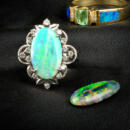
Gem in the Spotlight: Opal
… index of 1.37 – 1.47 and a Mohs hardness of 5.5-6. This makes it one of the softest gemstones commonly used in jewelry. For reference, here are the Mohs hardness values for some other gemstones you may know: Diamond 10, Sapphire 9, Amethyst… glue the fragile piece of opal to it before cutting and leaving them glued together after the fact to be set into jewelry. In triplets, that thin piece of opal is sandwiched between a piece of onyx and a clear piece of laboratory grown …
-
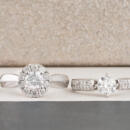
Anatomy of a Ring
… know when your ring may need maintenance. It’s also a fun way to impress your friends with your vast knowledge of jewelry terms. Shank Every ring has a shank. This is the technical term for the band of metal that encircles the finger. There… a part that we missed. If you are looking for the perfect ring, browse our online shop or contact us and one of our jewelry experts would be happy to help you find a ring that’s more than the sum of its
-

What are “Blood Diamonds”?
…are benefiting from the legitimate sale of diamonds. We at Arden Jewelers have been knowledgeable of the conflict diamond issue for years. We work hard to make sure every diamond and gem is legitimate. We want our clients and friend’s jewelry to be a source of pride, not of guilt. We are serious about not helping the evil doers in our world, by buying diamonds from illegal or immoral sources. Thank you for your trust in our integrity and if you have any question just call …
-
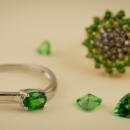
Gem in the Spotlight: Tsavorite Garnet
The discovery of Tsavorite in East Africa in the 1960s changed the jewelry world. Here was a gem with the color to rival the most exquisite emeralds and the clarity of the cleanest sapphires, all with the time tested durability of garnet. Tsavorite is a unique form of garnet with a stunningly vivid green …
-
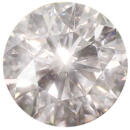
Diamond Buying Guide: The 4 C’s
… you like the look of a 1 carat, for example, you can use this C as the starting point for your diamond search. Once you know the carat weight and your budget, you can adjust the quality of the diamond to fit. Unless you work in the jewelry trade, it can be hard to know what size you want. The photo above shows some common diamond carat weights and how they look in comparison to each other. Cut The Cut of a diamond has two main components. First, cut refers to the shape of…
-
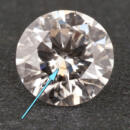
What Are Lab Grown Diamonds?
…term “synthetic” is so confusing in this context. With Moissanite we have a synthetic gem that looks and acts a lot like diamond but should never be referred to as a “synthetic diamond.” Because of this, along with most of the jewelry industry, we tend to use the term “lab grown diamond” to refer to a true synthetic diamond that shares the same chemical properties as a natural diamond, and we tend to avoid the term “synthetic diamond” given how much confusion it can create…
-
The Birthstones
… nightmares, promotes long-lasting love, and prevents hearing difficulties. Learn more about Garnet and Tasvorite Garnet February’s Birthstone: Amethyst Amethyst, transparent purple quartz, is the most important quartz variety used in jewelry. Purple has long been considered a royal color so it is not surprising that amethyst has been so much in demand over the years. Because amethyst was thought to encourage celibacy and symbolize piety, amethyst was very important in the…
-
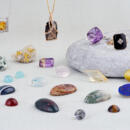
Gem in the Spotlight: Quartz
… agate was found in Sicily, and the ancient Romans set up lapidary (stone cutting) facilities to process these stones and turn them into something beautiful. To this day agates and other varieties of quartz have been staples of the jewelry industry. Quartz’s triboluminescent properties have been known for quite some time. The first scientific discovery of this effect was actually from sugar crystals in 1620, but it has been known by indigenous tribes for at least that long…